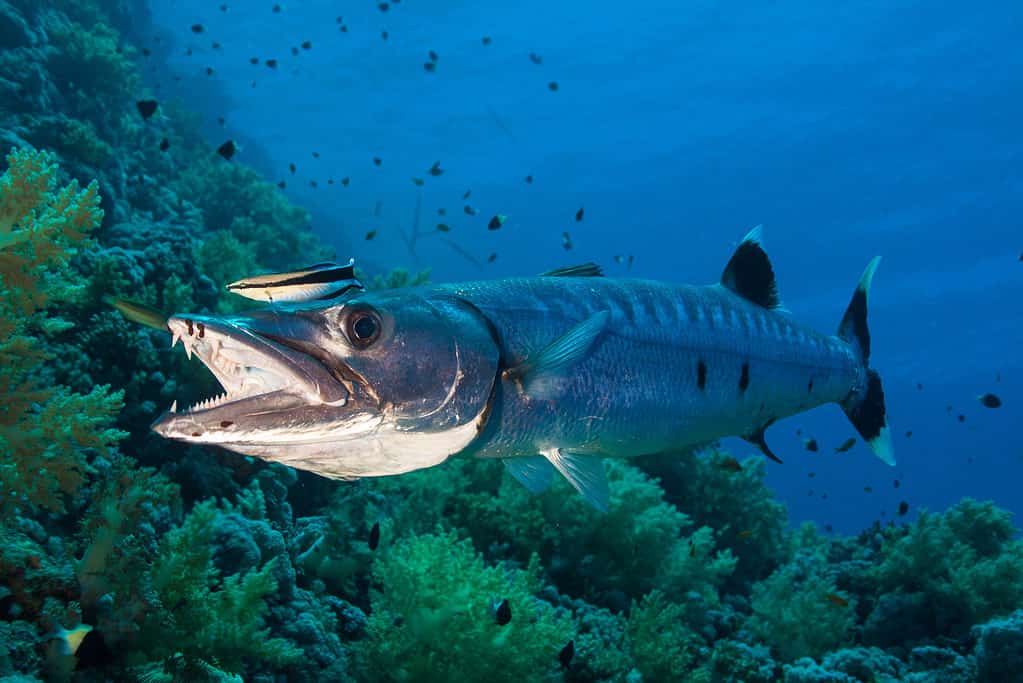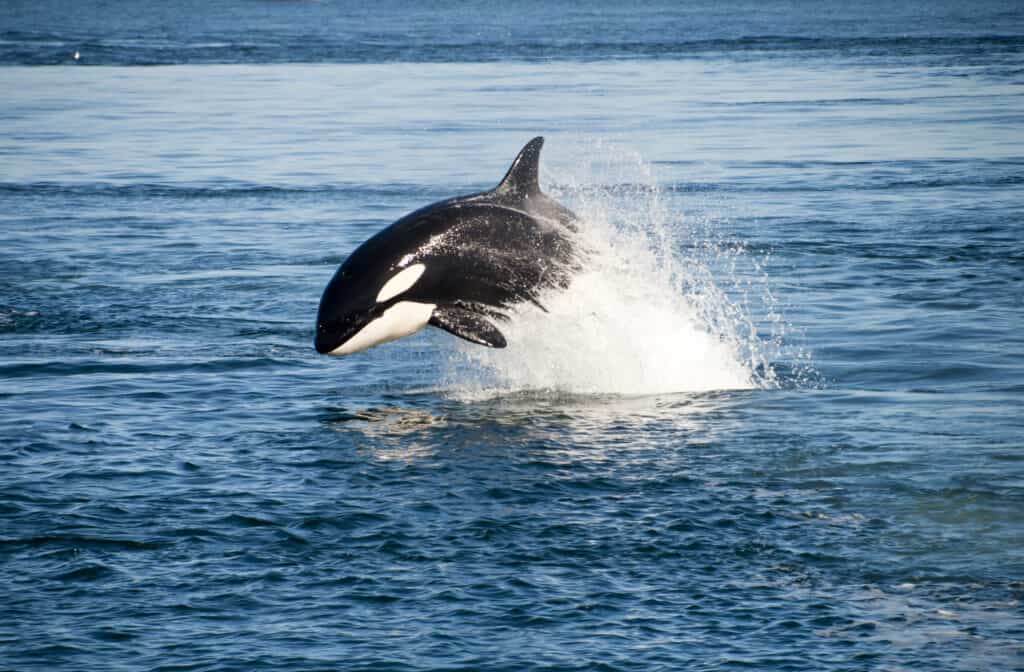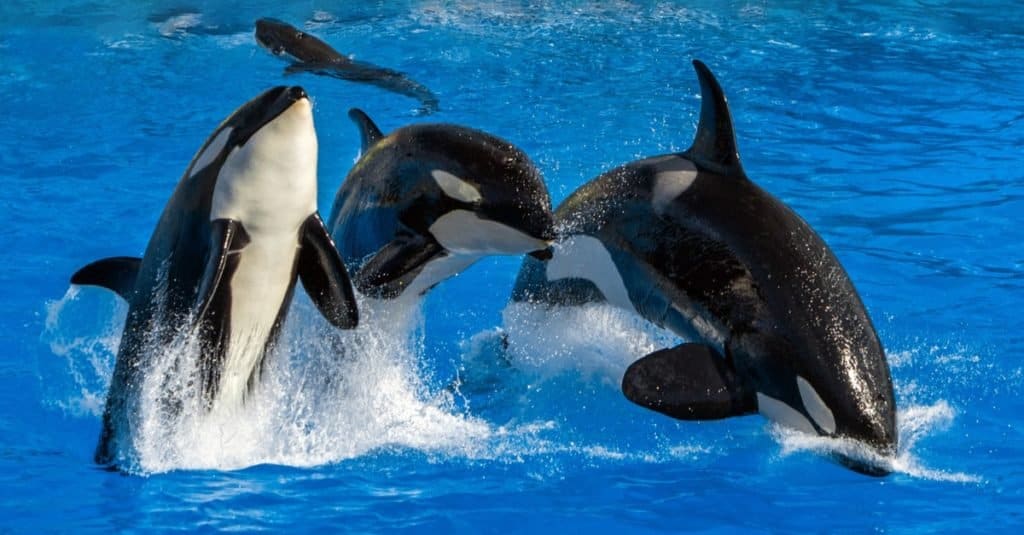It’s time for an animal battle! The world’s largest barracuda vs. killer whale, who will be the champion?
Great barracudas have over 100 razor-sharp conical teeth, making them look monster-like. These deadly teeth are designed to pierce and shred. Once they grab their prey, they can rip them to bits!
In comparison, killer whales have around 40 to 56 large conical-shaped teeth. These interlocking teeth usually measure 3 inches but can be up to 4 inches long. Using their powerful jaws and plentiful teeth, killer whales have a bite force that exceeds 19,000 PSI!
Who will emerge victorious when these two apex predators face off? Let’s find out! Follow along as we reveal how the fight would unfold between an oversized great barracuda and a killer whale.
Comparing a Great Barracuda vs. Killer Whale
| Animal Battle Factors | Great Barracuda | Killer Whale |
| Size | 5.5 feet long 103 pounds | 30 feet long 6-foot-tall dorsal fin 16,0000 pounds |
| Speed | 36 mph | 35 mph |
| Attack Abilities | Daytime ambush hunter Stealth and camouflage Charge attacks Sharp conical teeth Strong jaw muscle | Amush and pursuit hunter Herding fish Stunning with a tail strike Pushes opponent underwater Coordinated attacks |
| Defense Abilities | Large size Fast speed Hides well Dives deep into the ocean | Large size Fast speed Thrashes tail |
| Intelligence | Fairly Intelligent | Highly Intelligent |
| Survival Skills | Locates prey by sight Slender body helps them sneak around the coral reef Echolocation Travels in groups Layer of blubber to stay warm |
Competitor #1: World’s Largest Barracuda

The largest barracuda ever caught in Florida was a great barracuda. It weighed 67 pounds.
©Itstvan Kovacs/Shutterstock.com
Introducing competitor number one, the great barracuda. This large fish species can survive over 14 years in the wild and is renowned for its incredible size and speed. Great barracudas are so large and fast that sharks are one of the only predators capable of catching and eating them.
To make this fight more interesting, we won’t just compare the stats of any great barracuda. But instead, we’ll be looking at the world’s largest barracuda ever caught!
Competitor #2: Killer Whale

Killer whales live in oceans all over the world. They are especially plentiful in the cold waters in the Arctic, Antarctic and around Norway.
©qingqing/Shutterstock.com
Our second competitor is the killer whale, one of the most popular apex predators in the ocean. Also referred to as the wolves of the sea, killer whales are expert hunters who work together in pods. They’re the largest of the dolphins and earned their name when sailors saw them hunting other whales.
Pods of killer whales will hunt and eat blue whales, the largest animals on the planet. But that’s not all! These hunters aren’t even afraid of sharks! When killer whales and great white sharks face off, the shark is the first to flee the fight.
Animal Showdown: Key Factors in a Barracuda vs. Killer Whale Battle
In this fight between a great barracuda and a killer whale, we will compare a few of the animal’s key strengths. The key factors include size, speed, attack, defense, intelligence, and survival skills.
Both of these competitors are fast, smart, apex predators. But only one can be victorious in this animal battle! Follow along as the world’s largest great barracuda faces off with a killer whale in 3 rounds of fighting.
Round 1: Size and Speed
The first round of this animal battle will compare the size and speed of both parties. On average, great barracudas are between 2 and 4 feet long and weigh around 20 pounds. But the world’s largest great barracuda was over 5 feet long and weighed 103 pounds. That means adult great barracudas can weigh as much as a baby hippo!
Despite their large size, great barracudas are incredibly fast. They can reach blinding speeds of 36 mph thanks to their fork-tailed fin and streamlined torpedo-shaped body.
Killer whales can grow up to 30 feet long, and their dorsal fin can stand six feet tall. As for their weight, a fully mature killer whale can weigh as much as 16,000 pounds! That means killer whales can weigh more than a full-grown elephant.
Killer whales have a unique swimming technique called porpoising. This is where the whale swims below the water while occasionally rising to break the surface. It allows them to easily reach speeds of 35 mph since it requires less energy than swimming straight.
So who would win round 1? The killer whale! Even though speed is comparable to the great barracudas, their size lets them instantly take the win.
Round 2: Attack and Defense Abilities
The second round of this animal battle will compare competitors’ attack and defense abilities. The great barracuda is an ambush predator. That means they would wait for the perfect moment before launching an attack. Using the element of surprise, the barracuda could attack the killer whale before they knew what was happening. Then they’d snap their jaw shut and start shaking their head to drive their sharp teeth into the whale. But would this be enough to take down their opponent? Not likely.
The killer whale would chase the great barracuda and strike them with their tail. This is a similar technique they use when hurting large schools of fish. Once the great barracuda was dazed, the killer whale could rip it in two with a single bite.
Killer whales are pursuit predators and ambush predators. A pursuit predator doesn’t try to hide but chases its prey before attacking. And their prey isn’t always a simple school of fish. For example, a pod of killer whales in South Africa is beginning to hunt and eat great white sharks!
How would our competitors defend themselves? One of the barracuda’s best defense tactics is their swimming abilities and hiding skills. These large fish can dive deep into the ocean, and their narrow bodies allow them to squeeze into tight spaces.
The killer whale would have a three-part defense, size, speed, and fat! Killer whales have a thick layer of fat or blubber that would help protect them against the great barracuda’s razor-sharp teeth.
Round two goes to the killer whale. Killer whales are more powerful than great barracudas and have an added layer of protection: their blubber. And even if the great barracuda hides, the whale could use echolocation to seek it out.
Round 3: Intelligence and Survival Skills

The Orca is the largest of the dolphins and is a very intelligent animal.
©Andrea Izzotti/Shutterstock.com
The last round of our animal battle compares the world’s largest barracuda’s intelligence and survival skills against the killer whales. Our competitors are intelligent apex predators, but killer whales take home the trophy regarding smarts.
Killer whales have the second largest brain among all ocean mammals, with the sperm whale taking first place. Their brains are so big that a fully-grown killer can have a brain that weighs 15 pounds. In the animal kingdom, brain size is an excellent indicator of intelligence. This is evident in chimpanzees and elephants, two species with large brains and complex thinking skills.
As for survival skills, great barracudas are a master of their environment. These daytime ambush hunters know how to locate prey by sight. Their slender streamlined body helps them sneak around the coral reef, and their forked tail provides them with top speeds of 36 mph. These impressive fish aren’t particularly vulnerable to illness or injury. And they have a limited number of predators to worry about. In the wild, the solitary great barracuda could easily live 14 years.
Killer whales are also masters of their environment. Their tenacious hunting abilities help them take down large prey, so they’re almost always well-fed. In the wild, killer whales can live to be 90 years old. And unlike the great barracuda, who will spend most of their life alone, these whales can rely on the safety of their pod.
Round three goes to the killer whale! These apex hunters have one of the biggest brains in the animal kingdom, live almost 100 years, and understand the importance of group work.
Who Would Win in a Fight Between a Great Barracuda vs. Killer Whale?
The killer whale wins! After the great barracuda launches its ambush attack, it doesn’t take long for the killer whale to respond. The mighty whale will come out on top using its size, speed, attack, and defense abilities. When you add in the killer whales’ intelligence and survival skills, it’s clear that this animal battle was an easy win.
But that’s not to say that the great barracuda wouldn’t be able to inflict a lot of damage. Their razor-sharp conical teeth could tear into the whale’s blubber, creating a long-lasting injury. But the toothy attack wouldn’t be enough to kill the whale.
The only real advantage the great barracuda has in this fight is its ability to escape and hide among the coral reef. But once the killer whale finds them, it’ll be lights out! The whale wins every time when it comes to the world’s largest barracuda vs. killer whale.
The photo featured at the top of this post is ©
Thank you for reading! Have some feedback for us? Contact the AZ Animals editorial team.






